Talent
ERICA Student Startup Team
Participates in CES 2024
JinYoung Kim(Department of Robot Engineering, Class of 2019),
JiIl Kim(Department of Robot Engineering, Class of 2018)
Last January CES 2024, one of the world’s three-greatest tech (IT) consumer electronics shows, was held in Las Vegas, Nevada U.S. More than 4,000 companies from 150 countries joined the event including world-leading companies such as Google and Amazon, and Korea’s representative companies including Samsung and LG, also participated in to unveil their latest technologies and products. JinYoung Kim and JiIl Kim from ERICA visited the show and presented a missionoriented drone and an autonomous mobile rescue robot, respectively, as ERICA’s student representatives.
- Written by · KyeongDo Kim, student reporter (4th Nanum Supporters)
- Organized by · Editor's Office.
- Photo by · HyeonGu Lee
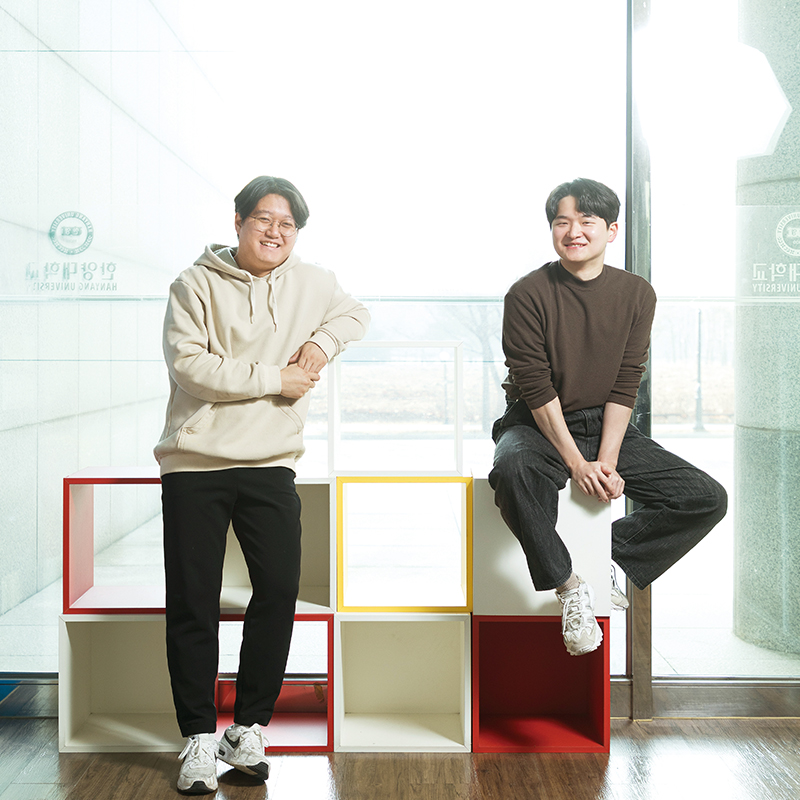
Two student entrepreneurs, dreaming of a better society through convergence technology
Over four days, from January 9th to 12th of this year, about 135,000 people visited CES 2024. In line with the theme of the show this year, ”All together, All on,” each participating company unveiled innovative products that were designed to be helpful in daily life. The various technologies were linked with related industries as a means to solve problems faced by people every day. In particular, all the companies involved presented technologies that combine artificial intelligence at the forefront, highlighting that AI will be the core next generation technology.
JinYoung Kim, ERICA’s student representative for CES 2024, and JiIl Kim, a representative of the CROV team consisting of six robot engineering department students, also participated actively in CES 2024 using AI based technology. JinYoung Kim is the current CEO of Autonomia Co., Ltd., and introduced to the world at CES 2024 the Dolphin System, a remote-controlled firefighting drone that enables fire suppression at an early stage. Whale, an AI-based autonomous drone that is designed to monitor fire outbreaks, detects the location of a fire and then transmits the location information to the Ground Control Station (GCS) that directs related systems on the ground.
Then, a heat-seeking fire extinguisher called ”Marine” is fired from a launching pad ”canister” to quickly extinguish the fire before it spreads and grows. Focusing on the fact that it is often difficult to respond instantly to forest fires and that there are many places where fire trucks cannot enter, Autonomia has established the world’s first rapid and clear drone-controlled firefighting system by combining various technologies.
The CROV team, of which JiIl Kim is a part, also created an autonomous mobile rescue robot that is gradually able to converge with AI-based technologies. The CROV team developed the item with practicality in mind so it can be operated at any location where a CCTV is installed. The ”Fall Detection Part” through which AI distinguishes human joints using a camera utilizes an algorithm that distinguishes the posture and movement of patients requiring CPR. When the algorithm detects that a patient has collapsed and is in critical condition, an autonomous mobile robot that identifies the patient’s location and avoids obstacles is dispatched to assist. Finally, when the robot arrives at the patient’s location, it sends real-time video showing the patient’s condition to the paramedics through a web server.
The robot can provide the necessary emergency treatment to the patient under the guidance of the paramedics through the cardiopulmonary resuscitation assist device attached to the robot.
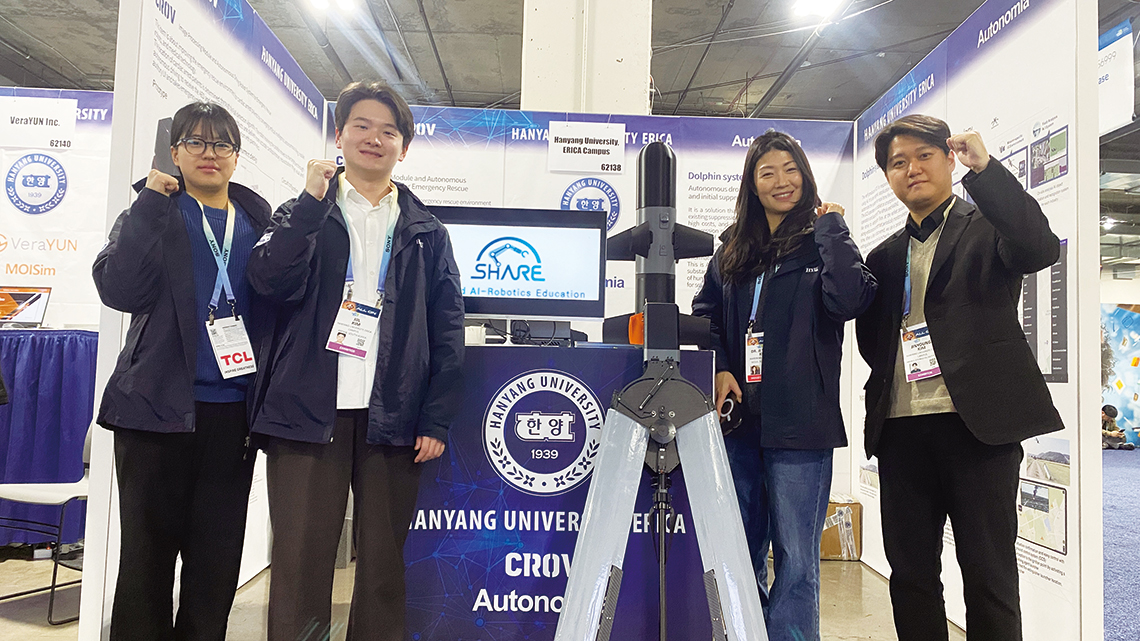 ERICA students attending CES 2024 held in Las Vegas, Nevada in the U.S.
ERICA students attending CES 2024 held in Las Vegas, Nevada in the U.S.
The power of ERICA entrepreneurs spotlighted at CES 2024
What these endeavors have in common is that they are part of a system that links various complex technologies to achieve one purpose. “Rather than simply using AI, it is more important to know how to converge AI technology with other technologies,” JiIl Kim explained adding, “Converging different technologies based on overall knowledge of technology will determine the future.” He is confident that the era of technological convergence is rapidly beginning.
The two students’ innovative ideas drew very positive responses from international buyers. JinYoung Kim explained that the local inventors, researchers, and companies are eager to quickly introduce new technology. “A visitor who lives in California said he would like to introduce the system quickly as it is urgently needed in that region.” For both students, CES 2024 was a positive and welcome experience as they had previously received quite a bit of skepticism at various exhibitions and competitions in Korea.
Jin-Young Kim remarked, “The Dolphin system was criticized by domestic investors who doubted the practicality of its implementation. I received a lot of questions about whether it was possible to find the appropriate altitude to launch the aircraft in a country which has a lot of military areas and mountainous areas, and whether I had tried putting out fires myself. I was also questioned whether I could really win a government bid.” At CES, however, both students felt reassured after hearing the positive responses and high expectations about the commercialization of their ideas and about the necessity to develop the potential of the product. CES 2024 was thus the perfect venue where they could gain new confidence in their products.
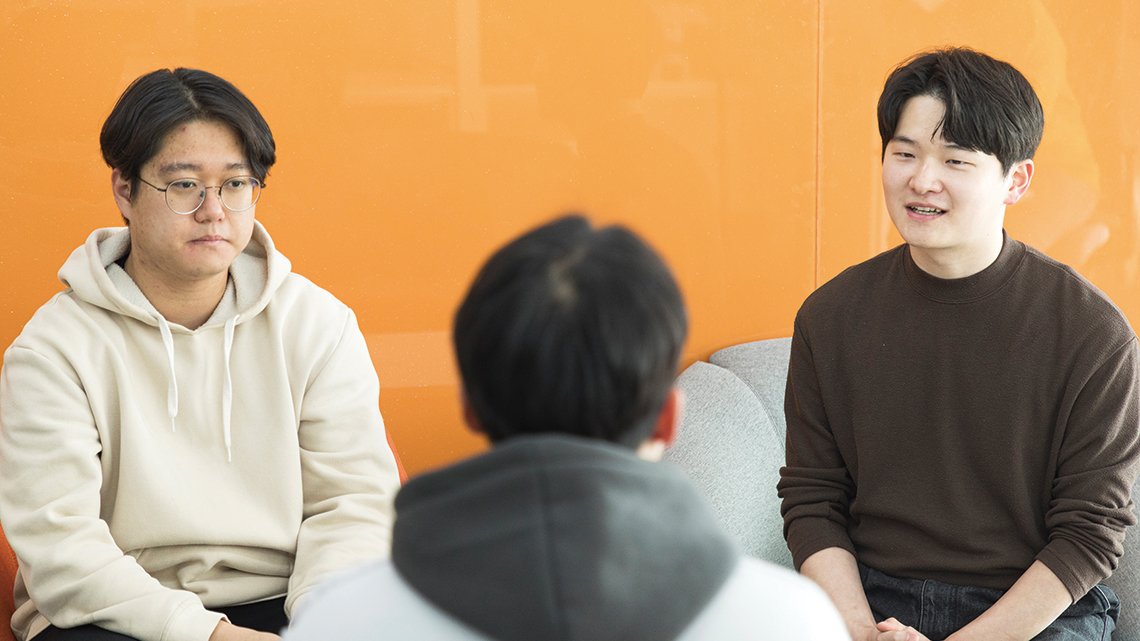 The two students answering the student reporter’s questions.
The two students answering the student reporter’s questions.
ERICA wishes them success as future
developers who can connect more parts of
Korean society with their new technologies.

A valuable experience and a stepping-stone to overcome greater future challenges
The two student entrepreneurs broadened the global potential of their products through CES 2024. JinYoung Kim expressed his disappointment that Chinese companies that are currently leading drone technology did not participate in CES. But he said he was motivated in continuing the development of his ideas by witnessing it firsthand, the technological capabilities of the world’s leading companies.
For JiIl Kim, CES 2024 was a challenging opportunity to reveal his long-cherished dream of starting a business and sharing it with the world. The experience of participating in several competitions and taking entrepreneurship classes served as a stepping-stone for him to unveil the autonomous mobile rescue robot at CES 2024. At the beginning of the Capstone Design class he attended, his robot was just a concept for an idea he had that he thought was unviable. However, through continued contemplation of a product that he believed could be helpful in daily life, his team was able to successfully design a marketable item. On the recommendation of Prof. TaeJoon Park of the Department of Robot Engineering, the team applied to participate in CES 2024. Fortunately, they were selected as a result of technologically improving their robot with all members of the CROV team.
JiIl Kim shared his goals saying, “Through this year’s show, I was able to see directly the amazing level of technology that global companies currently possess. Now, based on my experience in starting a business, I am planning to participate in the field of ”planning development” where I can realize my creative ideas in related companies.” Meanwhile, JinYoung Kim solidified his export plans through CES 2024, realizing the potential of the Dolphin system in Korea. He has been able to do so by first accessing overseas markets that have actively expressed their intention to purchase, rather than focusing on the domestic market, which he claims have too many obstacles to overcome immediately.
Both JinYoung Kim and JiIl Kim have demonstrated the positive influence of technologies in terms of gaining public interest through their firefighting system and emergency rescue systems, respectively. Through their experiences, they were able to share some tips on how to overcome challenges by connecting technologies. ERICA hopes that these two students will become successful developers who can help connect more of Korean society through technology.
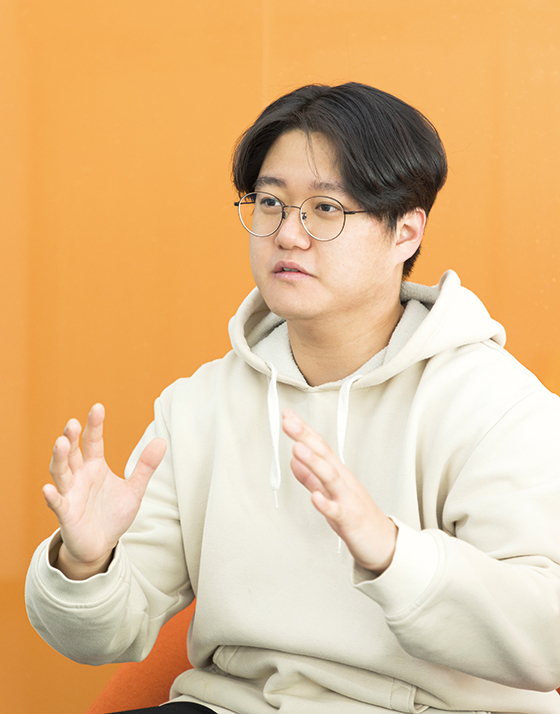 JinYoung Kim is broadening his horizons by making various attempts to commercialize the technologies of Autonomia.
JinYoung Kim is broadening his horizons by making various attempts to commercialize the technologies of Autonomia.
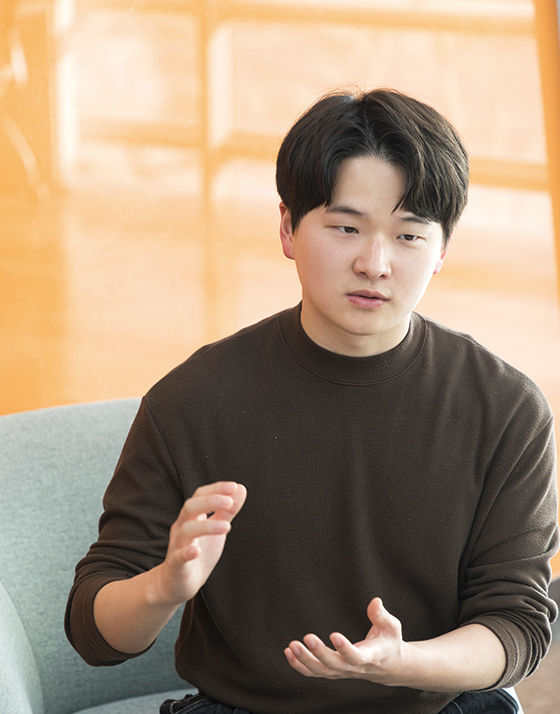 CES 2024 was an important opportunity for JiIl Kim to experience the world stage and determine his future direction.
CES 2024 was an important opportunity for JiIl Kim to experience the world stage and determine his future direction.






